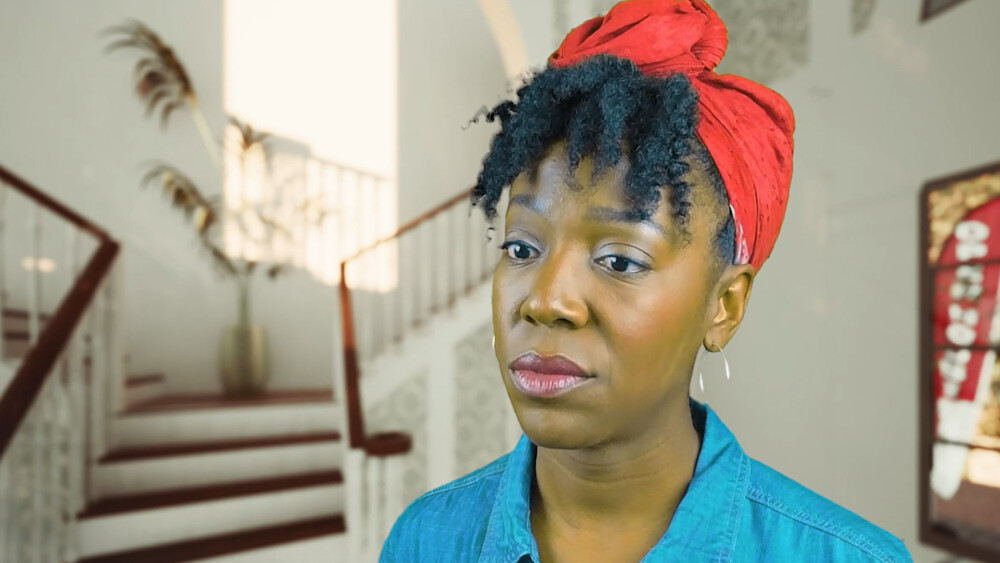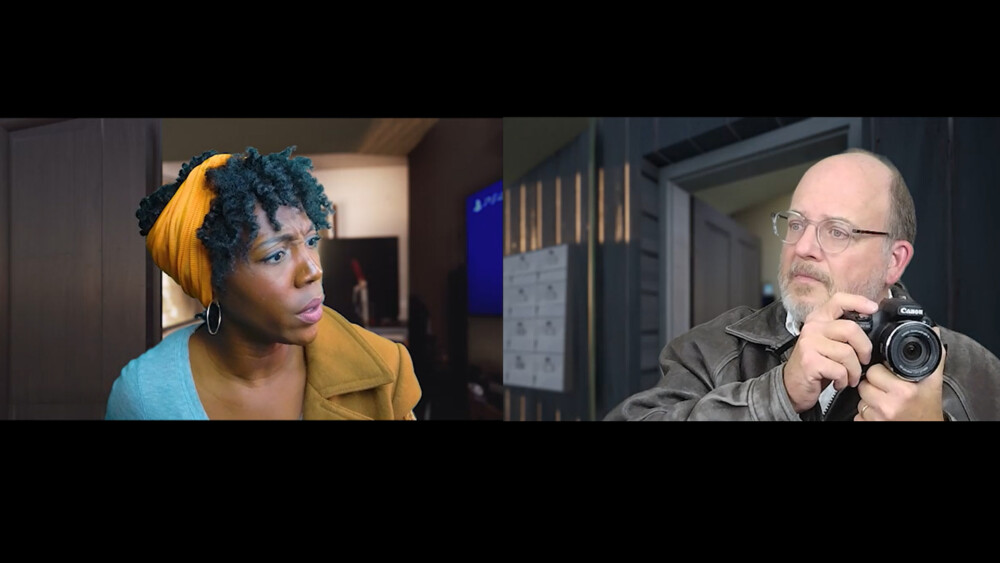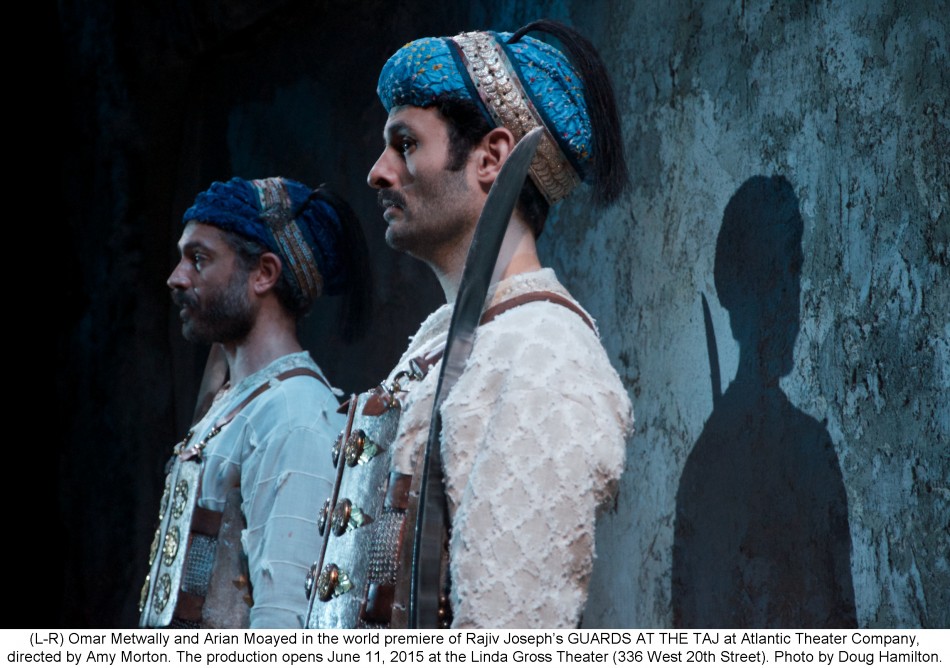Review by Carole Di Tosti – – –

The questions that playwright Nikkole Salter raises in Lines in the Dust, directed by Awoye Timpo, are subtly drawn and powerfully developed. One of the key issues raised is equitable access to a superior education based on wealth. In an institutionally racist society that is predicated on success delivered by educational achievement, what happens to families who only have access to inferior schools because they can’t afford to live in wealthier school districts?
Salter targets the fundamental problem of racial and economic inequality by establishing well drawn characters with clarity and specificity. Then she drops them in a high-risk, volatile situation which reveals the extent to which parents will go to insure their children have opportunities that the culture denies them.
Denetra (the superb Melissa Joyner) meets Beverly (Lisa Rosetta Strum), her perfect actor foil, during an open house in Millbrook, New Jersey. Millbrook, known for its superior public schools, also is known for its high taxes and expensively valued property. These conditions, ipso facto, discriminate economically and by extension exclude the racially and ethnically diverse in a systemic historical continuum of deprivation.


Interestingly, the two women bond immediately excoriating and ridiculing the discriminatory attitude of the female real estate broker who insults both by implying they can’t afford the high price of the house they come to tour. Both affirm that they are grateful that the price isn’t a problem, and they acknowledge that there are others who are not in their financially comfortable position.
In this opening exchange, Salter lays the groundwork subtly by playing on our assumptions about Beverly and Denetra, who are obviously successful and achievement oriented black women living in a tony area. And our perspective remains the same when both women meet again over a year later at Millbrook High School when Denetra solicits Beverly’s help with her daughter Noelle who attends the High School where Beverly Long is the principal.
Beverly manages to sandwich in Denetra’s visit between settling security problems and finalizing plans with Private Investigator Mike Di Maggio (the excellent Jeffrey Bean). During the course of Beverly’s discussions with Denetra and Mike, we learn about the shooting death of a student who didn’t live in the district and who was illegally registered at the school.
The chaotic situation creates angst for the Millbrook school district and community whose parents and resident “Concerned Citizen’s” league circle the wagons to prevent more such shooting disasters. Mike Di Maggio has been hired to ferret out all those illegal registrants who are “not contributing their fair share,” and who are potential troublemakers, despite their family’s enlightened desire to receive the “best education high property values can buy.”


As the weeks pass, Beverly’s relationship with Denetra and Di Maggio intensifies with complication and a final revelation. The stakes rise and issues of exclusion, financial immobility and the need to break the laws to achieve ones’s rights foment.
Underlying this play is Dr. Martin Luther King Jr.’s affirmation: “an unjust law is no law at all.” In Mike’s discourse with Beverly we learn he is a “closet” bigot as he ironically exposes the attitudes that have made discrimination an entrenched feature of school districts like Millbrook affirming “the law is the law.” That favored phrase was celebrated by Prime Minister Margaret Thatcher during “The Troubles” in Northern Ireland to justify economic oppression, social repression and harsh punishment for law violators.
Beverly Long, hired as a token of diversity to salve the guilt of the school board’s racial prejudice, is caught between a rock and a hard place. She must employ all her dignity, humanity and wisdom to keep her job in a district where she and her family are invested, where her son goes to school and where the underlying systemic racism has existed for generations cloaked in gentility, exclusion and educational privilege. She also has to confront her own hypocrisy and self-tokenism to maintain the privilege she was fortunate to have received.
For her part Denetra, a single mother, is struggling to put herself through school to advance her career, while encouraging her daughter to achieve and become upwardly mobile. She decides to break the law to establish her daughter as a “have” amongst the “have-nots.”


Mike De Maggio, too, is caught, a product of his own time and social group’s racial attitudes. He doesn’t understand the extent to which his entrenched views have been shaped by unjust circumstances. He has seen his former community in Newark run into the ground partially caused by federal programs created to “help” minorities which in in fact exacerbated systemic racism and stoked division and inequity. Denetra, Beverly and Mike must compromise their goals and do no harm, an impossibility.
Salter’s well-made play, directed with acute precision and nuance by Awoye Timpo and exceptionally performed by Joyner, Strum and Bean succeeds at this well-deserved revival. The virtual rendering is technically well executed to keep the audience engaged. Kudos to the creative team. I loved the “laid back,” understated, mellow music for a play of “white hot” currency, that is far from laid back, but which presents with authenticity the passionate views of each representative stakeholder.
Salter goes far in revealing how “we got here” without reducing issues to the stereotypical political rhetoric roiling in our present day. Of course, the further mammoth irony is the setting, 2009 when Barack Obama was president.
This timely offering by New Normal Rep is a must-see. Check their website for tickets and times to see this fine production at https://www.newnormalrep.org/.





















